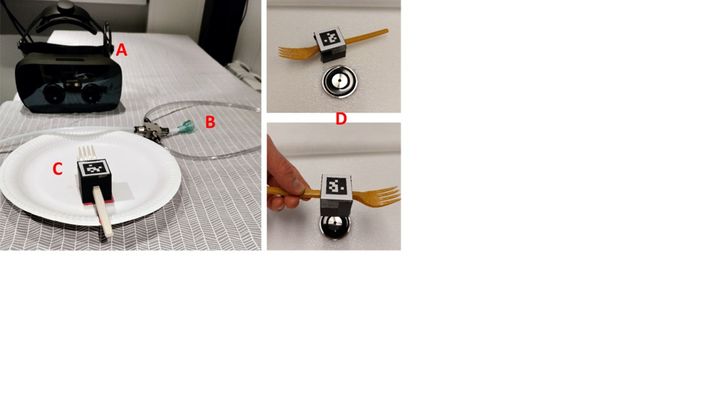Extended reality to help produce eco-friendlier food
Extended reality makes it possible to artificially modify human sensations. For example, researchers have succeeded in using extended reality to make vegetarian food even more attractive.
“This could be one way of facilitating more ecologically diverse food production and, at the same time, encouraging people to eat healthier,” says Roope Raisamo, a professor in human-technology interaction at Tampere University, who has been carrying out research on extended reality for different use cases with funding from the Research Council of Finland (RCF) for years.

Extended reality (XR) refers to all environments where reality meets the virtual world. It includes techniques such as augmented reality (AR), virtual reality (VR) and mixed reality (MR).
Raisamo’s research group recently completed a project that examined the impact of XR on the experience of eating food. The food research was led by Research Professor Nesli Sözer at VTT Technical Research Centre of Finland Ltd. The goal was to create eating experiences and new food items that people would find pleasant and that would give them a feeling of satiety. This could help make foods such as seaweed become more widely used in food preparation.
One experiment studied how introducing meat flavours to plant-based ‘meatballs’ changed the eating experience. By means of XR, a simple olfactory display added a pleasant fragrance to the meal. This side of the study was implemented by Raisamo’s group.
“The premise was to bring two previously rarely collaborating disciplines together to do something completely new,” says Raisamo. He has studied the use of haptic sensations in XR extensively.
Extended sensory experiences may be a future element in marketing and communication
“In the future, the olfactory and haptic sensations introduced by extended reality can be used in marketing and communication, for example. They’re not yet widely available, but some time from now, it will be quite possible to add modules that produce scents and haptic sensations to users’ devices. Haptic devices, meaning devices that produce touch sensations, are already on the market, but they’re not yet available to everyone,” says Raisamo. For example, social media channels favoured by young people could utilise these as part of communication.
Multisensory interaction is one of the strongest areas of Raisamo’s team. They had used artificial intelligence in their research long before AI became the phenomenon it is now. At present, Raisamo uses RCF funding to study the augmentation of a person’s functional capacity and situational awareness of where they are and what is happening. This project is also being implemented in cooperation with VTT. The University of Lapland is involved, as well.
“The results allow for the optimal use of extended reality systems through human-AI cooperation. We measure cognitive responses, task completion and user experience when a user interacts with an AI-based extended reality. We combine cognitive space modelling, detection, personalisation and forecasting with modelling, contextual awareness and adapting interaction methods,” Raisamo says, describing the project.
Raisamo has been carrying out research with RCF funding since 2001. Business Finland and the EU have also provided him with extensive funding.
Raisamo leads TAUCHI, the Tampere University Computer-Human Interaction Research Centre, which has 90 researchers in total. Raisamo’s own group includes 20 researchers. TAUCHI’s mission is to improve human-technology interaction by producing knowledge and solutions based on the natural ways people communicate.
Inquiries and more information:
- Roope Raisamo, Professor of Computing Sciences, Tampere University, tel. +358 50 570 2007, roope.raisamo@tuni.fi
- Article on the effects of sensory augmentations on food, published in the Journal on Multimodal User Interfaces
- Tampere University Computer-Human Interaction Research Center
Keywords
Contacts
Research Council of Finland Communications
Leena Vähäkylä, Communications Specialist
tel. +358 295 335 139
firstname.lastname(at)aka.fi
Links
The Research Council of Finland
The Research Council of Finland is an expert organisation in science and research. We fund high-quality scientific research, provide expertise in science and science policy and strengthen the position of science and research. We are a government agency within the administrative branch of the Finnish Ministry of Education, Science and Culture.
Subscribe to releases from Research Council of Finland
Subscribe to all the latest releases from Research Council of Finland by registering your e-mail address below. You can unsubscribe at any time.
Latest releases from Research Council of Finland
Research Council of Finland grants funding for international collaboration in high-performance computing17.12.2025 13:38:36 EET | Tiedote
The Research Council of Finland (RCF) has made funding decisions on the call ‘2025 Special funding for international collaboration in high-performance computing’. The RCF granted funding for twelve projects, totalling 6.4 million euros for 2026–2028.
Funding decisions on additional R&D funding calls: RCF opens up new avenues for excellent and high-impact research8.12.2025 13:21:50 EET | Tiedote
The Research Council of Finland’s (RCF) Subcommittee for Thematic Research has made the funding decisions on four thematically targeted funding calls. The total funding comes to nearly 37 million euros. The targeted calls were based on the 2025 state budget, which had also allocated funding for the implementation of the multiannual plan for the use of central government R&D funding. The funded research contributes to reinforcing high-impact R&D, supporting the utilisation of research-based knowledge and promoting cooperation between the different actors involved.
Research Council of Finland received 3,185 applications in winter call18.11.2025 15:16:16 EET | Tiedote
The Research Council of Finland’s (RCF) 2026 winter call closed for applications on 12 November 2025, with a total of 3,185 applications submitted for Academy Project and Academy Research Fellowship funding. The total number includes Academy Project consortium subprojects as separate applications. If each consortium is counted as a single application, the total number of applications comes to 2,737.
Strategic Research Council invites applications for funding for research into the Arctic region and mental health14.11.2025 12:02:46 EET | Tiedote
The Strategic Research Council (SRC) established within the Research Council of Finland is launching two new strategic research programmes. The six-year programmes start in late 2026.
Research Council of Finland selects projects to promote research utilisation4.11.2025 12:55:48 EET | Tiedote
The Research Council of Finland (RCF) has granted a total of 9.7 million euros to 27 projects (altogether 41 subprojects) in the 2025 Proof of Concept call. The application success rate was 26 per cent. The projects start on 1 January 2026 and run for two years.
In our pressroom you can read all our latest releases, find our press contacts, images, documents and other relevant information about us.
Visit our pressroom